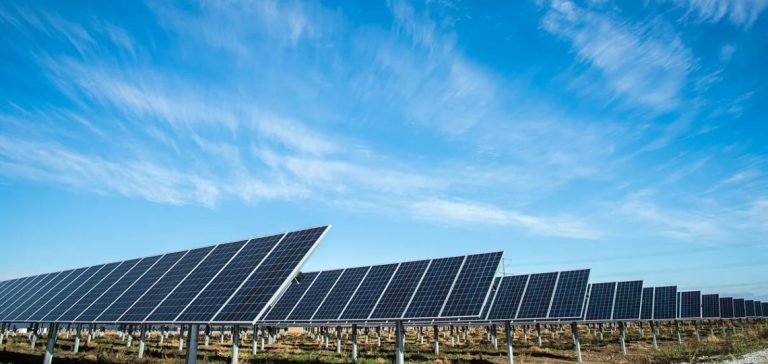India aspires to play a leading role in the global production of clean technologies to support its economic growth and reduce carbon emissions. The government has implemented policies such as the **Production-Linked Incentive (PLI)** to attract investments in solar modules and batteries, to meet domestic demand and position itself in the global clean energy supply chain.
A Policy Supporting Local Manufacturing
By 2030, India has set ambitious goals for the clean technology sector. The country has implemented various policies aimed at stimulating local manufacturing. These include customs duties on imported goods, approved manufacturers and models lists, as well as direct incentives through the PLI. These measures encourage national production and innovation in the clean energy sector.
Thanks to these policies, India’s production capacity for clean technologies is expected to increase significantly by 2030: 107 GW for photovoltaic (PV) modules, 20 GW for wind nacelles, 69 GWh for battery cells, and 8 GW equivalents for electrolyzers. This growth would enable India to achieve full self-sufficiency in solar PV and wind, as well as over 90% self-sufficiency in battery cells by 2030.
New Opportunities for Indian Exports
In 2023, the demand for clean technology components, such as solar PV modules, batteries, wind turbines, and electrolyzers, was largely met through imports, with 65% coming from China. Meanwhile, India’s local production, though limited, primarily targeted Western countries, generating higher prices.
With Chinese dominance over clean technology components, many markets have reinforced trade barriers and local content requirements. For example, the United States has imposed high anti-dumping and countervailing duties on Chinese solar cell and module imports and is currently investigating the production capacities of Chinese manufacturers in Southeast Asia. Consequently, India has significantly increased its module shipments to the United States, reaching 5 GW in 2023, 7.4 times its exports in 2022, thereby gaining market share from Chinese PV modules.
In the wind sector, the competitive dynamics have also changed. Historically dominant Western turbine manufacturers are now struggling to secure orders, while the market is increasingly dominated by two local companies and a leading Chinese vendor. This evolution has led to a unique challenge: while India has a vast turbine manufacturing capacity, a large portion remains underutilized, while a smaller fraction of this capacity operates at full capacity.
Some Western manufacturers have already repurposed their Indian factories for exports, while others are considering this option. However, this transition requires additional investments from these companies, which are already facing financial difficulties. Their priority remains the more profitable markets in Europe and North America, making the commitment to transform their Indian operations more complex.
The Costs and Product Mix Among India’s Challenges
Even a substantial increase in manufacturing capacity might not suffice to accelerate the renewable installations needed to meet India’s ambitious goals. The clean technology sector in India is still in its early stages and faces numerous challenges: lack of technological innovation, shortage of skilled labor, scarcity of raw materials, incomplete infrastructure, and risks related to inconsistent and delayed policy implementations.
In the solar PV sector, India struggles to achieve the desired levels of polysilicon and wafer production. Consequently, the country will remain dependent on imports to bridge these gaps, which undermines its cost competitiveness.
Moreover, India’s preferred wind turbine product mix does not naturally align with global standards, requiring additional investments to adapt the manufacturing base for exports. Furthermore, as India embarks on offshore wind development, additional manufacturing investments may be necessary in an already oversupplied market, as the existing onshore production infrastructure is not optimized to support offshore wind projects. However, the scale of these investments will ultimately depend on which company secures the offshore turbine contracts.
Local battery manufacturers entering India’s battery industry will need to allocate time to develop and enhance their production capacities. Currently, manufacturing operations in the country are primarily limited to battery pack assembly. These manufacturers face significant obstacles, including high capital expenditures, technological complexities, and challenges in securing essential raw materials. In the absence of a battery supply chain ecosystem, it is more economical for India to import lithium-ion battery cells from other countries.
Meanwhile, India’s hydrogen targets appear overly ambitious, reflecting global trends, with considerable hype surrounding hydrogen. Although India’s electrolyzer capacity is projected to grow significantly by 2030, the electrolytic hydrogen sector remains largely underdeveloped, requiring a more foundational approach. Additionally, the electrolyzer is only one component of a hydrogen facility; numerous other elements, such as transformers and renewable energy sources like solar and wind, are essential. These additional components often delay project timelines, further complicating the overall development process.






















